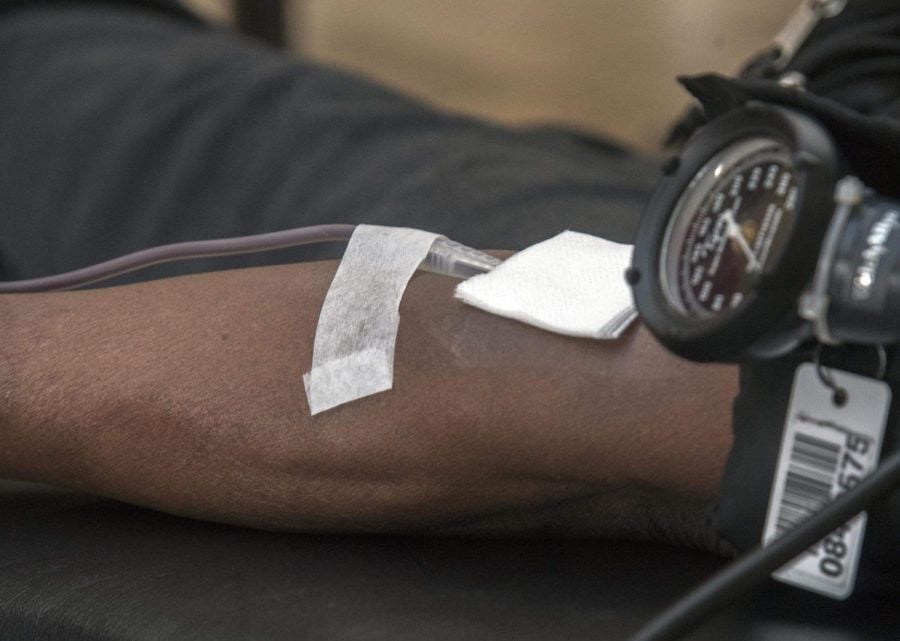Amid national blood shortage, here’s how Evanston residents can donate
Clifford Oto/The Stockton Record/TNS
Maurice Brett has his blood drawn by phlebotomist Rey Segura at a blood drive. Hospitals nationwide are currently facing a blood shortage.
October 18, 2021
Evanston resident Mike Kegler gave blood for the first time at a high school drive. Now, years later, he has turned blood donation into a habit, making appointments at Evanston Hospital every 10 weeks.
“You might be saving somebody’s life,” Kegler said. “It’s a small inconvenience, a small discomfort, for a potentially very large payoff.”
As the nation faces a blood shortage, prospective donors from Evanston have two local options: they can donate at Vitalant, which supplies blood to hospitals locally and nationwide, or at Evanston Hospital, which supplies blood to hospitals in the NorthShore University HealthSystem.
Hospitals canceled or postponed many elective surgeries at the beginning of the pandemic. Now, those surgeries are happening again.
“In the last few months, the demand has shot way back up from the hospitals, but the donations are still kind of at that leveled-off period,” said Matt Pitcher, Vitalant senior recruitment manager.
Pitcher said supplies of Type O-negative blood are especially low. O-negative “flies off the shelves” because hospitals typically give it to patients in emergencies before they can determine the patient’s blood type, he added.
Blood supplies also must be regularly refilled, which compounds the shortage. Platelets expire in five to seven days after collection, according to Dr. Thomas Gniadek, the medical director of NorthShore University HealthSystem’s blood bank. Red blood cells have a lifespan of about 35 to 42 days, he said.
“We have not gotten to the point where we are canceling surgeries because of a blood shortage,” Gniadek said. “Although we’ve been asked to implement measures to decrease our usage.”
Gniadek said those measures include more carefully auditing blood usage and possibly holding off on giving a transfusion when a patient’s hemoglobin or platelet count is in a borderline range.
Before giving blood, donors answer a questionnaire and undergo a quick physical screening, which Pitcher said involves checking blood pressure, iron levels and heart rate. The process also involves testing for infectious diseases, Gniadek said.
Depending on the blood donation location, donors can choose whether to give whole blood or a specific part of their blood, like platelets. Gniadek said he generally recommends first-time donors at NorthShore give whole blood.
Giving whole blood at Evanston Hospital takes 30 to 45 minutes, including the time someone spends filling out the questionnaire, Gniadek added. The whole blood donation process takes an hour total at Vitalant, according to its website.
Gniadek recommends that donors eat and hydrate beforehand. When SESP junior Charlotte Wong first donated blood, she didn’t know the importance of hydrating beforehand — which caused issues.
“I didn’t have enough experience, I didn’t drink enough water beforehand,” she said. “I didn’t donate enough blood.”
Wong hydrated before her second donation a few weeks ago and said it went more smoothly.
Both Vitalant and NorthShore follow the Food and Drug Administration’s regulations on blood donation. Donors must be at least 16 years old, at least 110 pounds and generally healthy. Certain medical conditions and medications can affect eligibility, as can travel or residency in certain countries, and different donation types often have additional requirements.
FDA guidelines recommend that donation centers have donors self-report “male or female gender” on donor history questionnaires. This can create barriers for transgender and non-binary potential donors, according to the Association for the Advancement of Blood and Biotherapies.
Individuals who in the past three months have used intravenous drugs or had sex in exchange for money or drugs, as well as those who were incarcerated for longer than 72 hours within 12 months, are also ineligible.
Men who have had sex with another man in the past three months, or women who have had sex with such men within three months, are currently ineligible to donate blood under FDA guidelines. Legislators and organizations including Human Rights Campaign have denounced this rule as discriminatory because it perpetuates a stigma against queer men, rather than screening people based on engagement in unprotected sex.
Before making an appointment, Pitcher recommends looking at a full list of criteria online. Donors can make an appointment through Vitalant’s website and can also fill out the health history questionnaire online rather than during the appointment.
To donate at Evanston Hospital, people should email or call Evanston Hospital Blood Bank to make an appointment. Gniadek said openings are generally between 8 a.m. and 3:30 p.m. on weekdays.
“Blood impacts everyone,” Pitcher said, urging residents to donate. “The need is constant. You never know when you or a family member might need blood.”
Email: [email protected]
Twitter: @avivabechky
Related Stories:
— Blood banks stabilize supply, prepare to collect COVID-19 plasma
— NorthShore University HealthSystem postpones all non-emergency surgeries


